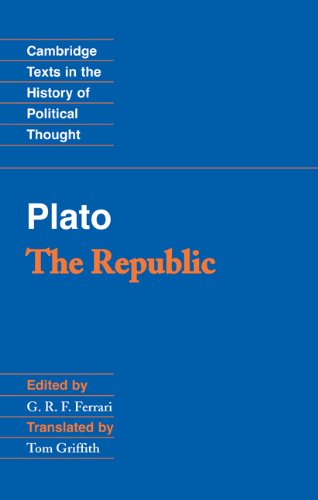Plato: The Republic (Cambridge Texts in the History of Political Thought) book download
Par bauman darla le jeudi, septembre 8 2016, 23:21 - Lien permanent
Plato: The Republic (Cambridge Texts in the History of Political Thought) by Plato, G. R. F. Ferrari, Tom Griffith


Plato: The Republic (Cambridge Texts in the History of Political Thought) Plato, G. R. F. Ferrari, Tom Griffith ebook
ISBN: 052148443X, 9780521484435
Publisher:
Page: 436
Format: pdf
In addition to Tom Griffith's vivid, dignified and accurate rendition of Plato's text, this edition is suitable for students at all levels. Plato: 'The Republic' (Cambridge Texts in the History of Political Thought) - G. Erasmus Lecture Handout James Hankins is a Professor of History at Harvard University who specialises in Renaissance intellectual history, history of political thought, philosophy, and the history of the classical tradition. Standard Greek Text; English Translations; General Discussions of the Republic; Discussions on Plato's Ethics and Political Philosophy; Discussions on the City/Soul Analogy. Socrates begins by discussing the origins of political life and constructs a just city in speech that satisfies only basic human necessities (369b-372c). Their idea of a liberal education, the studia humanitatis, continued to include grammar and rhetoric from the old curriculum, but added the study of a canon of classical authors writing poetry, history, treatises on politics, and moral philosophy. Plato's writings have been published in several fashions; this has led to several conventions regarding the naming and referencing of Plato's texts. Plato: 'The Republic' (Cambridge Texts in the History of Political Thought) $10.99. This is a completely new translation of one of the great works of Western political thought. Another development is Plato's increased awareness of temporality and history and their relations to politics and political theory. Corresponding to each of these, there is a capacity of the human soul: imagination, belief, thought, and understanding. Socrates is again the main character in the Republic, although this work is less a dialogue than a long discussion by Socrates of justice and what it means to the individual and the city-state. Their greatest innovation and delight, however, was the study of classical texts by the pagan authors whose focus on the secular world and elevation of the importance of mankind powerfully appealed to them.